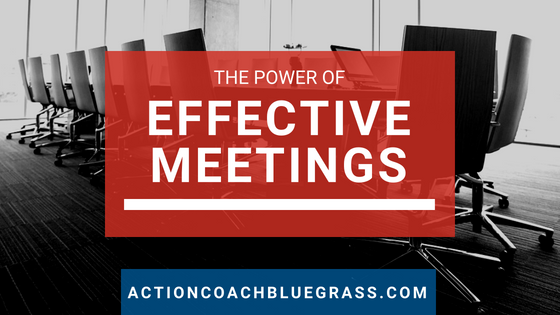[et_pb_section fb_built=”1″ _builder_version=”3.22″][et_pb_row _builder_version=”3.25″ background_size=”initial” background_position=”top_left” background_repeat=”repeat”][et_pb_column type=”4_4″ _builder_version=”3.25″ custom_padding=”|||” custom_padding__hover=”|||”][et_pb_text _builder_version=”4.4.2″ background_size=”initial” background_position=”top_left” background_repeat=”repeat” hover_enabled=”0″]

Whether I’m talking to my friends who work at big companies, or the ones who work at or own smaller businesses, I typically hear one of the following complaints: “too many meetings” or “not enough meetings”. When I ask those in the “too many” camp a few more questions, what I typically learn is that the problem isn’t really too many meetings, the problem is that the meetings aren’t very effective, and are considered a waste of time by most attendees. When I talk to the owners of small businesses in the “not enough” camp, I typically hear that they are trying to avoid the “death by meeting” environment of big companies, but often at their own expense. The reality is that effective, informative meetings are required and actually desired to grow any business, big or small. How else do you expect to communicate and coordinate efforts amongst team members and/or departments?
There really aren’t any secrets to effective meetings, as there are dozens of books and seminars and workshops on how to run effective meetings. The basic concepts include having a published agenda (standard if possible), starting on time, ending on time, etc… So if it is so easy, why do so many people and businesses struggle with them? While I am sure there are lots of reasons, I have always focused on one basic principle – ineffective meetings come from ineffective leaders.
Here are three simple keys to leading effective meetings that will help you to get more done in less time and energize your team before, during, and after your meetings. These are in addition to the “Effective Meetings 101” concepts I mentioned above
The first key is to make sure that there is a very clear, specific objective for the meeting. Not just a reason for having the meeting, but a very clearly stated and agreed upon objective or result that you desire for the meeting. Even for a general staff meeting, where the objective seems obvious, there can be a higher purpose to the meeting, something that even ties back to the Vision and Mission of the company for instance.
The second key is to start every meeting with the first agenda item (remember, a published agenda is a cornerstone of effective meetings) a recap of what went well since the last meeting. Each person should be prepared to share their (their teams) biggest win(s) since the previous meeting. We are all very good at focusing on problems, and spend a great deal of our time focusing on what went wrong. As leaders, we need to remember to get our teams to focus on what went right, and to recognize the successes they have, big and small. If time allows, the natural follow-up question for any win should be “And what did we learn from that?”. We usually remember to learn from our mistakes, but what about the power of learning from our successes?
The third key for leaders is to remember that the biggest value of the meeting may not actually be the meeting contents, but the process you take your staff/team through before, during and after the meeting. Of course the contents needs to be relevant and meaningful, and related to the objectives of the meeting, but quite often the more important value comes from the process your staff must go through to prepare for the meeting. Personally, I have found that the process of sitting down to prepare my list of wins/successes for the week to be a very uplifting and motivating activity, and feedback from the dozens of teams that I have taught this key reveals that they experience the same. By mixing the good in with the bad and ugly, leaders can send the message that they are all about building their staff/team, not breaking them down.
[/et_pb_text][/et_pb_column][/et_pb_row][/et_pb_section]

